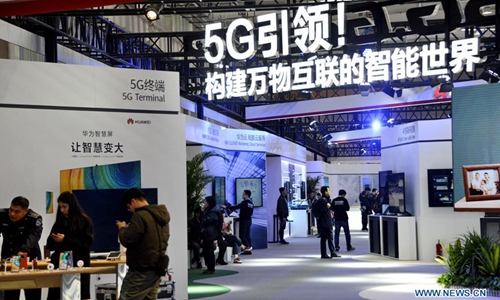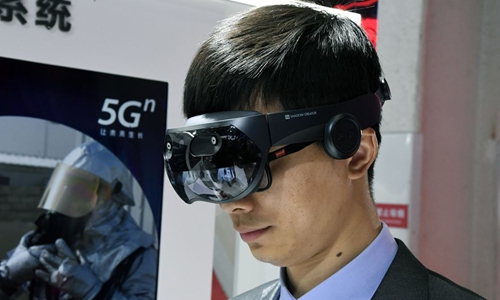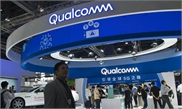SOURCE / INDUSTRIES
Qualcomm president says China to lead the world in 5G scale

Exhibitors display 5G-powered technologies during a press preview for the 2019 World 5G Convention in Beijing, capital of China, Nov. 20, 2019. The 2019 World 5G Convention will open here on Nov. 21. (Xinhua/Li Xin)
China will lead the world in the 5G scale and Qualcomm expects to increase business with China in the 5G transition, Qualcomm President Cristiano Amon said in an exclusive interview with Xinhua.
"China is likely going to have the largest 5G rollout and network," Amon said on the sidelines of Qualcomm's annual Snapdragon Tech Summit held this week in Maui, Hawaii. "The scale in China's deployment plans makes 5G ubiquitous with nationwide coverage as fast as possible."
"In terms of taking the importance of 5G as the future of Internet, I think China is doing the right thing with an accelerated rollout of this technology," he said.
In June, China granted commercial-use 5G licenses to the country's top three telecom operators -- China Telecom, China Mobile and China Unicom, as well as China Broadcasting Network. Many Chinese tech companies unveiled their 5G smartphones.
According to the China Academy of Information and Communications Technology, 5G technology is expected to create more than 8 million jobs by 2030.

A staff member displays a Mixed Reality (MR) terminal device at the 2019 World 5G Convention in Beijing, capital of China, Nov. 21, 2019. (Xinhua/Ren Chao)
"I believe China understood since the very beginning that 5G will be the essential infrastructure to connect to the Internet. And the numbers that the three operators had made public are incredible," Amon said.
"If Chinese operators execute on its plans, we will see 1 million 5G base stations by the end of 2020. And that is going to build the infrastructure that will not only connect billions of smartphones, but multiple billions of others smart devices and industries that will benefit from 5G," he said.
In his opinion, China regards 5G as fundamental infrastructure for the society, which gives the country the advantage on the scale and the commitment to its deployment.
5G touches many industries, not only cell phones, but also smart cities, automobiles, healthcare and other sectors. It is now understood by governments worldwide that 5G is so important and no country will benefit from being late to 5G, Amon said.
Unlike the deployment of 3G and 4G networks when China was behind other key markets, the country is now in the forefront of 5G transition with other leading economies, Amon said. "I believe that is a sign of the maturity of the Chinese economy today," he noted.
Optimistic about the progress of the Chinese mobile ecosystem, Amon noted that it is very consistent with the Belt and Road Initiative (BRI). "As the mobile ecosystem follows the relationship and the expansion of the Chinese economy through all those different countries, it is likely to be very competitive in the transition to 5G."
He cited the examples of Chinese tech companies such as Xiaomi, OPPO and OnePlus. Phones of Xiaomi are now in the portfolio of virtually every operator in Europe, while OnePlus is growing in the United States, traditionally a very difficult market.
"We have now two vibrant companies of China's ecosystem in the U.S. market, one is OnePlus and the other one is Motorola-Lenovo, with the new Razor being a great innovation in the market," he said.

Visitors watch a 5G robot during the 2019 World 5G Convention in Beijing, capital of China, Nov. 21, 2019. (Xinhua/Peng Ziyang)
China's mobile ecosystem will take the opportunity of the 5G transition to grow outside China and establish a very strong position in the markets such as Southeast Asia, Latin America, Eastern and Western Europe and the United States, Amon said.
Saying he is "super excited" about Qualcomm's business in China, he applauded the win-win cooperation between Qualcomm and its Chinese partners, such as Xiaomi, OPPO, OnePlus, vivo and Motorola.
Amon called the cooperation an example of successful relationship between the two countries, adding that it allows Chinese partners to not only grow in domestic consumption, but also expand outside China with the BRI.
"We are not backing down on our China cooperation. We're increasing our cooperation in resources towards or partnerships in China in the 5G transition," he said.
According to Amon, despite the current China-U.S. trade frictions, Qualcomm's business with China is increasing, rather than decreasing. "I expect that to continue in 2020 and 2021 as we go to this 5G transition."
At the summit, Qualcomm unveiled two new 5G Snapdragon mobile platforms -- Snapdragon 865 and 765/765G. It also announced the world's first 5G-supported extended reality platform, modular 5G mobile platforms and new 3D sonic fingerprint technology.
Defining the role of Qualcomm as an enabler of mobile ecosystem and partnerships, Amon said that 5G has unlocked an era of the "Invention Age."


